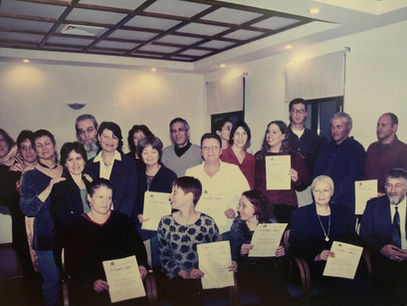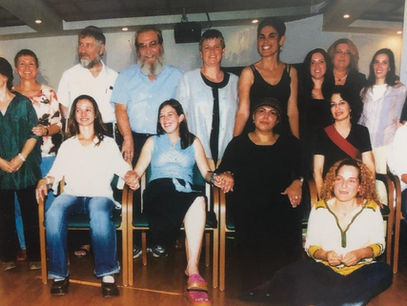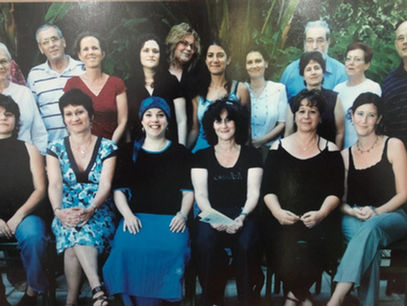Therapist Training in Israel
Have you always dreamed of specializing in a fascinating
and life-changing therapeutic field?
The training of therapists for the treatment of infantile autism according to the Mifne approach - a two-year program for the training of therapists for the treatment of infants with autism.
For more information about the training program, fill out the form and we will contact you as soon as possible:

A two-year program for the training of therapists for the treatment of autism in infancy according to the Mifne approach
in collaboration with the Continuing Studies Unit of the School of Social Work at Bar Ilan University
In recent years, we are witnessing a significant increase in the number of children diagnosed with autism. Studies indicate that intensive and high-quality therapeutic intervention in infancy can lead to a significant change in the functioning of infants diagnosed at risk of autism. The treatment at a young age is fundamentally different from the intervention in later stages of development.
We invite you to join the most comprehensive training in the field of autism - the two-year program for training therapists to treat infantile autism according to the Mifne approach. The program is affiliated with the Continuing Studies Unit of the School of Social Work at Bar Ilan University. The program is intended for therapists who wish to specialize, expand and enrich their tools in this fascinating field, and for future therapists who are curious and interested in integrating into this key and much needed therapeutic field.
about the Mifne (Turning Point) Approach
The Mifne approach for the treatment of infants with autism has been developed since 1987. The Mifne Center is a pioneer in the field of infant treatment in Israel and worldwide. A screening tool for early identification of the risk of autism in the first year of life was developed at Mifne in 2007, piloted at the TLV Sourasky Medical Center.
The Mifne approach is a developmental-emotional systematic approach that takes place within the family. 88.3% of the babies who were treated at The Mifne Center are fully functioning in mainstream educational settings!
The first school for training therapists to work with infants in the community according to the Mifne approach was established at Bar Ilan University, School of Social Work Science in 2001. Students from Israel and abroad are exposed to a unique, exciting and optimistic field of therapy that has a decisive effect on the development of infants at risk of autism.
The educational program includes: acquisition of theoretical and practical knowledge, a general introduction to child development, the psychological, physiological and neuro-developmental foundations of infancy, an introduction to family therapy, the development of autism in infancy, infants’ observation, early detection analysis, empowering the therapist, and practical personal training in a family home in the community (practicum).
Time Is of The Essence!
The Mifne approach for the treatment of infants with autism has been developed since 1987. The Mifne Center is a pioneer in the field of infant treatment in Israel and worldwide. A screening tool for early identification of the risk of autism in the first year of life was developed at Mifne in 2007, piloted at the TLV Sourasky Medical Center.
The Mifne approach is a developmental-emotional systematic approach that takes place within the family. 88.3% of the babies who were treated at The Mifne Center are fully functioning in mainstream educational settings!
The first school for training therapists to work with infants in the community according to the Mifne approach was established at Bar Ilan University, School of Social Work Science in 2001. Students from Israel and abroad are exposed to a unique, exciting and optimistic field of therapy that has a decisive effect on the development of infants at risk of autism.
The educational program includes: acquisition of theoretical and practical knowledge, a general introduction to child development, the psychological, physiological and neuro-developmental foundations of infancy, an introduction to family therapy, the development of autism in infancy, infants’ observation, early detection analysis, empowering the therapist, and practical personal training in a family home in the community (practicum).
about the Mifne (Turning Point) Approach
The Purpose of the Program
-
To impart theoretical and applied knowledge in the field of detecting infants at risk and treating infants diagnosed on the autism spectrum and their families.
-
To train therapists to work with at-risk infants and toddlers diagnosed with autism according to the Mifne approach in the families' homes and in the community.
Target Population
-
Professionals with at least a bachelor's degree and experience in the fields of education and therapy
-
Therapists in the paramedical and psychology field
-
Therapists that have experience working with families - treatment, counseling
The Structure of the Program
The study program takes consists of a two-year hybrid format, and opens for enrollment once every two years.
-
Phase I
Theoretical studies alongside personal and group experience, is held alternately at Bar-Ilan University, The Mifne Center, and learning via Zoom.
A total of 256 study hours
-
Phase II
Emphasis on clinical studies and analytical observations in the treatment of infants, including personal experience, which takes place alternately at the Mifne Center in Rosh Pina and through Zoom studies.
A total of 336 study hours
-
Practical Work (Practicum)
The studies are combined with practical work in the families' homes according to geographical proximity, twice a week, accompanied by supervision.
A total of 72 hours
The course curriculum includes a total of 592 academic study hours + 72 hours of practicum
* Studies in the program are continuous with the exception of holidays and a month-long summer vacation
* The studies will be held for two years on Wednesdays from 10:00 am-5:00 pm
Syllabus
Syllabus
Phase I
A general introduction to the development of the child; the psychological, physiological, and neurodevelopmental foundations in infancy; typical development versus developmental disorders; risk factors for the development of neurobehavioral deficits; Introduction to Family Therapy; theoretical models in family development; relationships in the family; Introduction to psychotherapy; the autism spectrum: early detection in infancy; personal and group experience; interaction and play techniques, play therapy in the sandbox; skill development and understanding of non-verbal communication; the behavioral and experiential elements in bonding; communication in an interpersonal relationship; strengthening the therapist's personal abilities.
Phase II
Attachment Theory; understanding of the dynamics in treatment; therapist-patient relationship; treatment of crisis situations in the family; diagnosis and assessment: observing infants; ESPASSI©; scientific basis for diagnosis and its role in the process of understanding developmental disorders; language development; nutrition and eating disorders; practicing observation and observation skills; practical methodology of data processing; techniques and tools of therapeutic strategies; Strengthening therapeutic skills in a developing family system; siblings; applying continuous feedback as a tool for self-understanding and behavioral changes; defense and resistance mechanisms of the self and others and development of means of coping; behavioral and experiential foundations in bonding and communication in the interpersonal relationship; the theory of dialogue; feedback theory; integration in kindergartens, personal and practical experience.
Practical Work (Practicum)
Practical work in the homes of the patients' families based on geographic proximity, accompanied by individual and group guidance and supervision from the Mifne Center; processes in treatment and application; completion of theoretical knowledge chapters; guidance colloquium for the submission of a thesis.
The program includes the integration of toddlers into a kindergarten framework, with guidance and assistance.
Faculty
-
Dr. Alonim, A. Hanna, Expert in the Autism Spectrum and Mental Health in Infancy; Founder and Head of the Mifne Center, Head of the Training School
-
Mrs. Carter Ronnie, clinical psychologist expert; supervisor at the Afek and the Winnicott Institute.
-
Mr. Fajerman Tzvi, clinical psychologist and expert in infants’ observation.
-
Dr. Gurevich Mina, Pediatrician; expert in Early Childhood Development and Gastroenterology.
-
Dr. Kidron Michal, Psychologist; Head of Play Therapy Program at Oranim College.
-
Mrs. Otmazgin Nahar Irit, Family and couplhood therapist, group facilitator.
-
Mrs. Podisuk Reisner Rinat, Art therapist, lecturer and instructor.
-
Dr. Shaham Yehuda, Psychologist, instructor in family therapy, trauma specialist.
-
Ms. Shamir Daphna, Psychotherapist for children, and adults with severe dysregulation.
-
Dr. Tayar Danny, pecialist in family medicine at the Mifne Center, Supervisor at Continuing Medical Education, Health Ministry.
Training Staff at The Mifne Center
-
Einat Kadosh, Psychotherapist and Supervisor
-
Veronika Jakobson, Developmental Therapist
-
Dr. Ifat Fajerman, Developmental Therapist
Academic Coordinators
-
Dr. Ifat Fajerman, Mifne Center
-
Ms. Dafna Asher, Bar Ilan University
-
Registration fee: 200 NIS paid by check to Bar-Ilan University
-
Personal and professional resume (including academic education, practice, in-trainings, publications, etc.)
-
Passport picture
-
Photo copy of diplomas (B.A., M.A., Ph.D.), and any other relevant certificates
* Admission is determined upon personal interviews
* Upon confirmation of admission, applicants are committed to the full program
Tuition:
The tuition fee for the academic year will be updated when registration opens
Tuition: 23,000 NIS + 200 NIS registration fee
-
First year: 12,000 NIS + 200 NIS registration fee
-
Second year: 11,000 NIS, including lunch and refreshments on the study day at the Mifne Center
Tuition will be divided into six payments linked to the July cost of living index every year.
Those who successfully complete the program, including the obligation of practical work, will be awarded a diploma certifying completion of studies in the program for training therapists according to the Mifne approach, on behalf of the Continuing Education Unit of the Lewis and Gabi Weisfeld School of Social Work, Bar-Ilan University and The Mifne Center.
For more details, call: 04-6931021 or fill out and send the form and we will contact you as soon as possible:
The Mifne approach for the treatment of infants with autism has been developed since 1987. The Mifne Center is a pioneer in the field of infant treatment in Israel and worldwide. A screening tool for early identification of the risk of autism in the first year of life was developed at Mifne in 2007, piloted at the TLV Sourasky Medical Center.
The Mifne approach is a developmental-emotional systematic approach that takes place within the family. 88.3% of the babies who were treated at The Mifne Center are fully functioning in mainstream educational settings!
The first school for training therapists to work with infants in the community according to the Mifne approach was established at Bar Ilan University, School of Social Work Science in 2001. Students from Israel and abroad are exposed to a unique, exciting and optimistic field of therapy that has a decisive effect on the development of infants at risk of autism.
The educational program includes: acquisition of theoretical and practical knowledge, a general introduction to child development, the psychological, physiological and neuro-developmental foundations of infancy, an introduction to family therapy, the development of autism in infancy, infants’ observation, early detection analysis, empowering the therapist, and practical personal training in a family home in the community (practicum).











